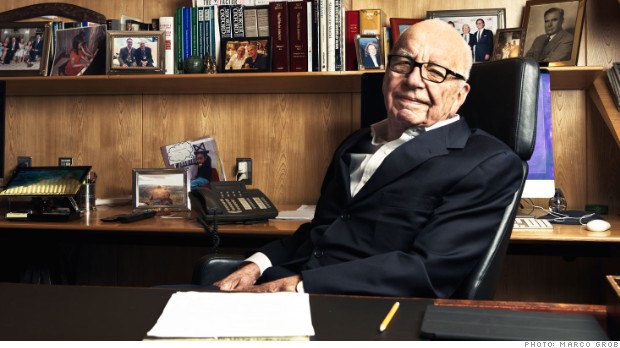
Murdoch at his desk at News Corp. headquarters in New York City
(Fortune)
And though battered by turmoil and strife -- and a recent fall on his head, as he revealed in this Q&A -- Murdoch seems newly secure as the world's most powerful global media billionaire. Starting with a single Australian newspaper that he inherited from his father in 1952, Murdoch built News Corp., which owns the Wall Street Journal, the New York Post, the Times of London, the leading newspapers in Australia, and book publisher HarperCollins. Last July he split News Corp. from 21st Century Fox, which owns the Fox broadcast network, cable assets including Fox News and new ESPN rival Fox Sports 1, the 21st Century Fox movie studio, and satellite broadcasting operations across Europe, Asia, and the Middle East. The combined stock market value of his two companies exceeds $80 billion. Murdoch owns nearly 40%, controls the voting stock, and calls the shots.
Murdoch recently handed the keys to the kingdom to his two sons. Lachlan, 42, is the new nonexecutive chairman of both News Corp. and 21st Century Fox -- a stunning comeback for Murdoch's elder son, who in 2005 quit his News Corp. job over clashes with senior management and returned to Australia to build his own empire. Son James, 41, who was tarnished in News Corp.'s phone-hacking scandal, moved up to co-chief operating officer at 21st Century Fox.
Fortune: You've had a very eventful past few years. How have you come out of this, and has it taught you anything?
Murdoch: Oh, it's been stressful. I'm quite open about it. I was reluctant to see the company split, and now I've got to say that I've been proved wrong. I think it's been a great success. And I'm not talking about the share market. I think the two companies, which were all in one before, are now much more focused, which will lead to faster growth.
Why were you reluctant to split the company?
I guess it was emotional.
You, some say, "endowed" News Corp. with close to $3 billion in cash. Meanwhile, Time Inc. is spinning off from Time Warner with $1.3 billion in debt. Does that make sense to you?
No. Well, I don't want to criticize here. It's a very fine company with great assets. But print is going through a tough time. There's got to be a lot of money spent on digitizing everything. You've got to keep improving and competing in a new world, as well as keeping your old world going. So to have some spare cash gives you a lot of security. Whereas at Time I would imagine that the new management is going to be looking immediately at how can they save money. I hope we're not wasting money, but we're spending.
What don't people understand about you?
Well, they perhaps tend to think I've not got as thick a skin as I have. You know, I don't mind what people say about me. I've never read a book about myself.
Has this been your toughest period ever?
Well, everything has sort of come at once. But I was in an unhappy situation, and all I'm worried about or do worry about is two beautiful little girls from that marriage [to Wendi Deng, whom he divorced last November]. And they come and stay with me a great deal. I feel like I've turned over a new page in my life.
How long do you think you will live?
Well, my mother just died at 103, so that's a start. You should live 20 years longer than your parents. [Laughs.] That may not be realistic, but I'm in good physical shape, according to the doctors. And don't worry -- my children will be the first to tell me if I start losing some mental ability. That will be the time to step back.
News Corp. acquired Dow Jones in 2007, bringing the Wall Street Journal into its stable of print assets needing to adapt to a digital age. Efforts to leverage Dow Jones's Factiva business database have faltered.
Let's talk about the newspaper business. Is it fair to say that the game is to cut costs faster than revenue declines and --
No!
Why is that wrong?
Well, obviously when you come to a difficult period, you look at all your costs very, very carefully. But we haven't gone nearly as far as some of the other papers have, like the L.A. Times and the Chicago Tribune or a lot of lesser papers. We've added a lot of things to the Wall Street Journal. We honestly believe that it's the best newspaper in America, if not the world.
Why keep the New York Post going? I don't know what it lost last year, but I think that in 2012 it lost $40 million.
Anda sedang membaca artikel tentang
The Fortune interview: Rupert Murdoch
Dengan url
http://ngopingeteh.blogspot.com/2014/04/the-fortune-interview-rupert-murdoch.html
Anda boleh menyebar luaskannya atau mengcopy paste-nya
The Fortune interview: Rupert Murdoch
namun jangan lupa untuk meletakkan link
The Fortune interview: Rupert Murdoch
sebagai sumbernya
0 komentar:
Posting Komentar